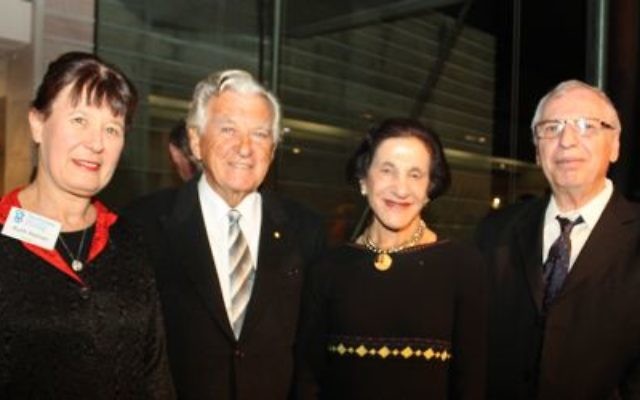Technion head at the cutting edge of science
UNMANNED mine removal vehicles, microscopic “nano-swimmers” that deliver medication directly to the area of the body that needs it, and a robotic snake were some of the latest groundbreaking projects presented by Professor Danny Weihs at the Technion Society of Australia’s 2011 celebration supper last Sunday.
UNMANNED mine removal vehicles, microscopic “nano-swimmers” that deliver medication directly to the area of the body that needs it, and a robotic snake were some of the latest groundbreaking projects presented by Professor Danny Weihs at the Technion Society of Australia’s 2011 celebration supper last Sunday.
Prof Weihs is head of the Technion’s Autonomous Systems Program, and chief scientist of the Israel Ministry of Science and Technology.
He was joined by NSW Governor Marie Bashir and former Australian prime minister Bob Hawke, who both spoke warmly of Israel’s first and leading university, and the Jewish State’s status as a centre of technological innovation.
Established in 1924, the Technion has played a key role in the establishment of the State of Israel, providing civil engineers to build infrastructure, mechanical engineers for industry and even developing defence
equipment during the time of the British mandate. As Prof Weihs told The AJN, it will also be essential to the nation’s future.
“I cannot overstate the importance,” he said. “Just to exist, we need science and technology, both on a military and economic front.
“We need science and technology, even in surprising areas. One of the largest areas of export is agriculture, but driven by science and technology, for example varieties of seeds.”
Prof Weihs listed several major issues facing Israel that the Technion is studying, including water, alternate energy sources and scarcity of manpower.
He noted the Technion Society of Australia’s contribution in establishing a water research institute.
“[Honorary life president] Malcolm Chaikin has supported that for many years,” Prof Weihs pointed out.
He said the Technion was looking into robots and autonomous systems as a method to replace manpower, especially in defence spheres.
“Jews are very empathetic. We have one prisoner of war, Gilad Shalit, and the whole country is working to get him out,” he said.
“The major point is to have weapons systems which are unmanned so we don’t get more prisoners.”
Prof Weihs also spoke about the Technion’s contribution to Israel’s reputation as a “start-up nation”.
Students work on projects designed to encourage them to think about development. A well-attended undergraduate course in entrepreneurship is also offered.
Prof Weihs also acknowledged the role of contributions from groups outside of Israel to help fund infrastructure at the university.
“We can get research money for specific research projects, but to build new buildings or buy big new equipment, that needs bigger money and does not come out of government grants.
“These are mainly based on donations,” he said.
More information: www.austechnion.com.
GARETH NARUNSKY
From left: Technion Society of Australia president Ruth Ratner, Former Australian Prime Minister Bob Hawke, NSW Governor Marie Bashir and Professor Danny Weihs


comments